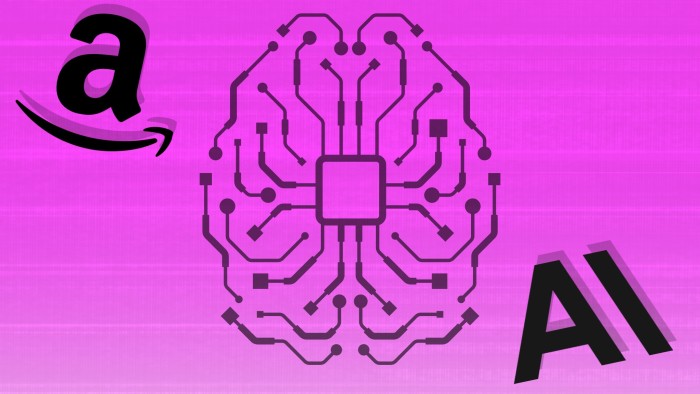Amazon is weighing another multibillion-dollar investment in Anthropic to deepen a strategic alliance that the tech companies believe will provide an edge in the global competition to profit from artificial intelligence.
The Seattle-based cloud and ecommerce group has discussed plans to extend beyond the $8bn it has already ploughed into the San Francisco-based AI model builder, according to multiple people with knowledge of the talks.
A new deal would further a relationship that — according to interviews with more than a dozen Amazon and Anthropic executives, board members and investors — has become vital to both their futures.
The investment will ensure Amazon remains one of Anthropic’s largest shareholders, as it seeks to position ahead of Google which has also invested more than $3bn, while providing a bulwark against a similar multibillion dollar partnership between Microsoft and OpenAI.
It would also deepen ties as the pair collaborate on one of the world’s largest data centre projects and team up on sales of Anthropic’s technology to Amazon’s cloud computing customers.
“We quickly realised that we had many shared goals that were fundamentally critical,” said Dan Grossman, vice-president of worldwide corporate development at Amazon. “The size of the [existing investment] represents our ambition.”
The strategy of close alignment comes with risks. Microsoft’s $14bn investment into OpenAI helped the duo take an early lead in the race to commercialise AI products, but that alliance is under strain because of the ChatGPT maker’s desire to move to a for-profit model.
Anthropic was founded in 2021 by seven former OpenAI staff including siblings Daniela and Dario Amodei who left over ethical and safety concerns. It was initially a cloud computing customer before Amazon made a $1.25bn investment in September 2023.
The Amazon deal ensured Anthropic had a “reliable source of compute and investment” at a time when Microsoft was locked into an agreement with OpenAI that would have precluded it from acting as a partner, according to one of the Seattle-based group’s executives.
In June, Amazon outlined the scale of its first site for “Project Rainier”, a large-scale data centre programme that will help meet Anthropic’s computing demands. Filled with the cloud providers’ Trainium2 chips, the facilities in New Carlisle, Indiana will draw 2.2 gigawatts in power when completed, far surpassing the scale of Oracle’s ambitious 1.2GW campus for OpenAI in Abilene, Texas.
Amazon detailed at least $11bn in investment for a cluster of 16 data centres in Indiana last year, but plans for the site have since doubled.
Mike Krieger, Anthropic’s chief product officer, said it had worked “really closely” with Amazon to ensure that the Big Tech group’s Trainium2 chips were suitable for its models. “The ability to have Amazon, who is developing their own chips and has the knowhow and expertise, open to our requirements, is massive,” he said.
The two companies are already discussing plans for future sites attached to Project Rainier. “The goal is to always be way ahead of what your customers are going to need,” said David Brown, vice-president of compute at Amazon Web Services. “I call it the illusion of infinite capacity.”
While Amazon is developing its own in-house foundation models, it has sought closer ties to Anthropic than Google, which is focused on building its own powerful AI models called Gemini.
The “fair value” of Amazon’s investment in Anthropic is about $13.8bn, according to regulatory filings. Its backing came in the form of convertible notes, with only a portion turned into equity so far.
Both tech giants’ stakes are capped to keep them well below owning more than a third of Anthropic. They each have no voting rights, board seats or board observer seats. Google owns roughly 14 per cent, according to legal filings.
Anthropic’s most recent equity valuation is $61.5bn, set by investors in March, according to PitchBook.
Amazon has made other investments in AI companies, including Hugging Face and Scale AI, but Anthropic is its third-largest investment to date behind MGM Studios and Whole Food Markets.
Executives at the Seattle-based group are confident that the partnership with Anthropic would be more robust than Microsoft and OpenAI, as the start-up was structured as a public benefit corporation rather than a non-profit. Investors hold equity, unlike with OpenAI where they are beholden to a complex profit share agreement.
Anthropic has previously said that it is “not owned or dominated by a single tech giant” and has chosen to remain independent.
Yet, Amazon has manoeuvred itself to be named Anthropic’s primary cloud and training partner.
The model builder counts on Amazon’s data centres and its specialised Trainium semiconductor chips to develop and deploy large language models. However, Anthropic also uses Google’s custom AI accelerator chip — a Tensor Processing Unit (TPU) called Trillium.
Claude, meanwhile, is embedded in Amazon products such as its improved digital voice assistant Alexa+ and streaming service Prime Video.
One Anthropic investor said Amazon’s salespeople more clearly promoted the start-up’s Claude series of models to its cloud computing customers than search giant Google.
“Google pushes Gemini in every interaction, despite backing Anthropic. They will sell Gemini at every opportunity,” added the start-up’s investor. “Amazon’s default is to sell Claude.”
Google has previously said that more than 4,000 customers used Anthropic’s models on its cloud platform. The search giant declined to comment.
Atul Deo, director of Amazon Bedrock, the company’s AI app development platform, said that the company was cautious about preferring a single AI partner. “Forcing something on customers is not a good strategy,” he said, noting that an alternative provider’s models could soon be in demand.
But Kate Jensen, Anthropic’s head of revenue, said that the two companies pitched to potential customers together. “We sit down and say, you’ve already trusted Amazon with your data,” she said. “You need the world’s best model.”
Anthropic has an annual revenue run rate of more than $4bn, according to people familiar with the matter, a sliver of the $107bn AWS generated in the 2024 fiscal year.
Amazon’s decision to invest in training its own AI models, however, remains a risk for Anthropic, which relies on the tech giant to provide a robust pipeline of corporate customers which are its main revenue source.
David Luan, a former OpenAI executive, is leading the cloud provider’s pursuit of artificial general intelligence — systems that surpass human abilities — and his team has built what the company describes as “dependable AI agents” that have benchmarked better than Anthropic’s equivalent.
“There are benefits and some drawbacks to the way the relationship is structured but at the end of the day Anthropic look to us to solve a lot of their problems,” added one Amazon executive.







